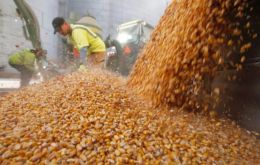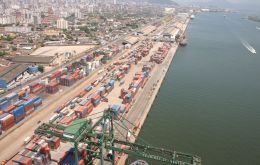MercoPress. South Atlantic News Agency
Tag: Imports
-
Wednesday, August 13th 2025 - 10:34 UTC
Argentine SMEs losing ground to imports

A report by the SME Observatory Foundation (FOP) warned that one-third of Argentina's small and medium-sized industrial enterprises (SMEs) were losing market share to imports. The study, which surveyed 407 companies, found that 45% of SMEs feel a growing threat from imported goods, the highest level since 2007.
-
Friday, March 14th 2025 - 10:55 UTC
Brazil lifts import taxes of foodstuffs to lower inflation

Brazil's Chamber of Foreign Trade's (Camex) Executive Management Committee (Gecex) gave its nod Thursday to the temporary removal of import taxes on nine food items to lower prices for local consumers. The tax exemption applies to boneless frozen beef, roasted and unroasted coffee beans, corn (not for sowing), certain uncooked pasta, cookies, extra virgin olive oil, crude sunflower oil, cane sugar, and preserved sardines (limited to 7,500 tons). Taxes ranging between 7.2% and 32% have been lowered to 0% in a move to curb inflation. The measure is effective starting Friday. Authorities insisted it would only be for a limited time.
-
Tuesday, March 11th 2025 - 09:51 UTC
Brazil’s trade suffering the impacts of lower prices for commodity exports and rise in imports

Brazil’s trade balance during February experienced a monthly deficit of US$ 323.7 million, the first since January 2022, (US$ 59,1 million). This compares with a trade surplus of US$ 5.13 billion in the same month a year ago. However despite the negative result, Brazil maintained a trade surplus of US$1.9 billion for the first two months of the year, according to Valor Economico, the leading financial media of South America’s leading economy.
-
Wednesday, March 10th 2021 - 08:49 UTC
Chinese foreign trade booming in the first two months of 2021

China's total goods imports and exports expanded 32.2% year on year to 5.44 trillion Yuan (some US$ 838.16 billion) in the first two months of 2021, sustaining growth momentum in previous months, official data showed. Exports jumped 50.1% while imports rose 14.5% in Yuan terms, according to the General Administration of Customs (GAC).
-
Saturday, October 17th 2020 - 08:48 UTC
Brazil considering temporarily zero tariffs on corn and soybean imports outside Mercosur

The Brazilian government is set to discuss a proposal that would temporarily eliminate tariffs on corn and soy imports from countries outside the Mercosur trade bloc, as recently happened with rice, a staple of the Brazilian diet.
-
Wednesday, April 3rd 2019 - 08:39 UTC
Brazil posts lower trade surplus in March with a strong rise in imports

Brazil posted a trade surplus of US$ 4.99 billion in March, the Economy Ministry said, significantly smaller than the same month a year ago thanks to a strong rise in imports. The trade surplus last month fell 22.3% to US$ 4.99 billion from US$ 6.42 billion a year ago, although that was up more than a third from February’s surplus of US$ 3.67 billion.
-
Thursday, February 28th 2019 - 09:15 UTC
US trade deficit widens sharply in December: imports increase, exports drop

The US trade deficit widened sharply in December as slowing global demand and a strong dollar weighed on exports, another sign that economic growth slowed in the fourth quarter. Other data from the Commerce Department on Wednesday showed new orders for US-made goods barely rose in December and business spending on equipment was much weaker than previously thought, pointing to a softening in manufacturing activity.
-
Monday, January 7th 2019 - 09:29 UTC
Brazil meat exports had a complicated 2018, buts sales are picking up

Export sales by Brazilian meat processors lagged last year as trade bans and a domestic truckers’ strike weighed on their ability to serve major customers like Russia and the European Union, according to data released by trade group ABPA.
-
Thursday, October 18th 2018 - 08:24 UTC
Despite grumblings, US refrains from labeling China a “currency manipulator”

United States has refrained from labeling China a “currency manipulator” in a move which may help defuse escalating tension over trade between the two countries. President Trump has previously accused China of keeping its currency weak to make its exports more competitive.
-
Thursday, September 27th 2018 - 09:17 UTC
China unveils plan to cut tariffs on over 1.500 industrial products

China on Wednesday unveiled plans to cut tariffs for products including machinery, electrical equipment and textile products beginning on Nov. 1, as the country braces for an escalating trade war with the United States.
